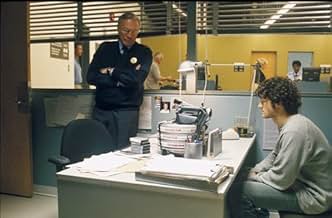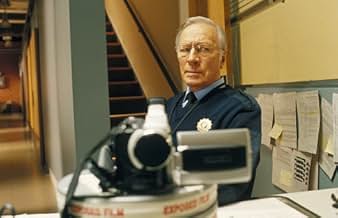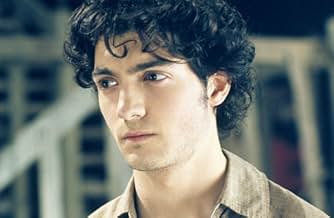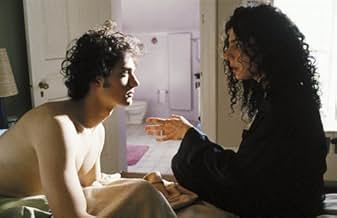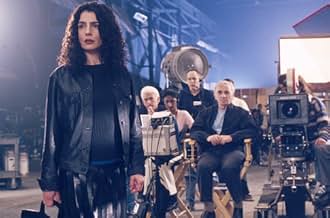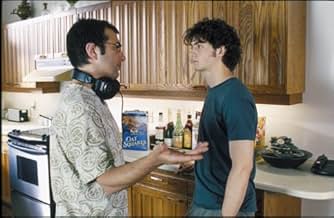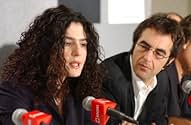Ararat
- 2002
- Tous publics
- 1h 55m
Interrogated by a customs officer, a young man recounts how his life was changed during the making of a film about the Armenian genocide.Interrogated by a customs officer, a young man recounts how his life was changed during the making of a film about the Armenian genocide.Interrogated by a customs officer, a young man recounts how his life was changed during the making of a film about the Armenian genocide.
- Awards
- 12 wins & 13 nominations total
- Director
- Writer
- All cast & crew
- Production, box office & more at IMDbPro
Featured reviews
The action takes place in a film that Edward Saroyan is filming about the genocide. At another level we see an Armenian historian, Ani, lecture about what really happened. Ani's son is in love with his step-sister, something that seems repugnant to the mother. Celia, the object of Raffi's love, keeps showing up wherever Ani speaks to shame her.
On another level, we see the how Raffi, having returned from a trip to Turkey is being interviewed by a Customs officer at the airport. We realize Raffi doesn't want to have the sealed film reels examined by the wise inspector. Their conversation go back and forth as one learns the truth.
This multi layered film has the rich texture only a director like Atom Egoyam could give it. He is at his best, as he clearly proves in his direction. Arsinee Khanjian, plays Ani with such fire that she smolders the screen any time one sees her. Ms. Khanjian is one of the best interpreters of her husband's work. Her expressive face shows what clearly is going in her mind at any given moment.
The rest of the cast responds well to the director's guidance. David Alpay, Christopher Plummer, Marie-Josee Croze, Elias Koteas, Eric Bogosian, Charles Aznavour and Bruce Greenwood, a veteran actor of some of Mr. Egoyan's films, do excellent acting in the film.
The only problem for most viewers seem to involve not having any background to the tumultuous time the film depicts, thus making it a bit unapproachable. "Ararat", like "Hotel Rwanda" and films that have captured the human suffering, is a film to treasure.
Another superb aspect of the film was how the cinematic production within the movie acted as the segway between the current and past events because the actors are also characters in the "main" movie; that's a structural piece of "real" cinematic mastery.
One major problem is the star-role presence of his ubiquitous (in his films) wife, who can't act well and simply cannot use her voice expressively or effectively. Her monotonic droning, in film after film, is irritating.
Another is that he doesn't have the directorial chops to film in an epic style such as the Armenian battle scenes require.
The lopsided voting pattern here seems to be the result of ethnocentric ballot-box stuffing. All those "10"s could only mean that thousands of Egoyan's compatriots have invaded the board and voted politically rather than esthetically or rationally.
Did you know
- TriviaArarat (2002) premiered as part of the 'Official Selection' at the 55th Cannes International Film Festival in 2002, but it was not 'In Competition' for any awards. Atom Egoyan's prior feature [Le voyage de Felicia (1999)] and his subsequent feature [La vérité nue (2005)], artistically less ambitious films, were both screened 'In Competition' at Cannes. The reasons for "Ararat" not being part of the 'Official Competition' in 2002 are still ambiguous: Some claim there was political pressure on the festival by Turkey, while Egoyan said he himself decided not to enter Ararat (2002) into the competition: "This film is dealing with a period of history that has never been represented before on film. The idea of subjecting that to the additional pressures of a jury - given all the pressures that are on this film already - seemed to be unnecessary."
- Quotes
Raffi: But he thinks Turkey was at war with Armenia. Doesn't it bother you that he doesn't get the history?
Edward Saroyan: No, not really.
Raffi: I mean why didn't you explain to him that we were citizens, we were Turkish citizens. We had a right to be protected.
Edward Saroyan: Are you driving him home?
Raffi: Yeah.
Edward Saroyan: Huh. Take this.
[hands him dollar bills]
Edward Saroyan: Buy him a bottle of champagne. Let him think that he has done something special.
Raffi: Something special? I'm sorry, Mr Saroyan, I don't think I understand.
Edward Saroyan: Young man, do you know what still causes so much pain? It's not the people we lost, or the land. It's to know that we could be so hated. Who are these people, who could hate us so much? How can they still deny their hatred? And so hate us... hate us even more?
- Crazy creditsClosing disclaimers: 1) The historical events in this film have been substantiated by holocaust scholars, national archives, and eyewitness accounts, including that of Clarence Ussher. 2) To this day, Turkey continues to deny the Armenian Genocide of 1915.
- ConnectionsFeatured in The Making of 'Ararat' (2003)
- SoundtracksMystery
Written by Gord Downie (as Gordon Downie) and Atom Egoyan
Performed by Gord Downie (as Gordon Downie)
From the album "Coke Machine Glow"
Courtesy of Wiener Art Records - copyright 2000
Copyright 2000 - Wiener Art (SOCAN)/Egoyan Ego Film Arts (SOCAN)
- How long is Ararat?Powered by Alexa
Details
- Release date
- Countries of origin
- Official sites
- Languages
- Also known as
- A級控訴
- Filming locations
- Turkey(Stock Footage, church ruin on the island)
- Production companies
- See more company credits at IMDbPro
Box office
- Budget
- $15,500,000 (estimated)
- Gross US & Canada
- $1,555,959
- Opening weekend US & Canada
- $211,130
- Nov 17, 2002
- Gross worldwide
- $2,743,336
- Runtime
- 1h 55m(115 min)
- Color
- Sound mix
- Aspect ratio
- 1.66 : 1




